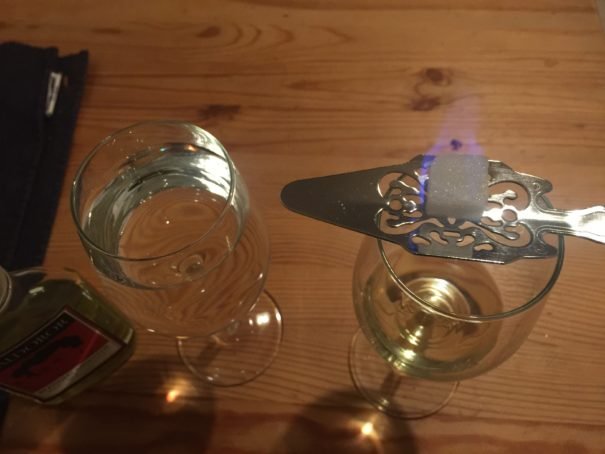
Absinthe, Sugar, and Fire For This Scrooge

Absinthe, Sugar, and Fire For This Scrooge

Absinthe in Berlin
In the past, I hated Christmas. Now, I counteract this feeling by doing Christmas-y things. That’s why I decided to hop around the Berlin Weinachtsmarkts, or holiday markets, taking pictures and vicariously soaking up festive, holiday cheer from people whom I, all things being equal, would probably dislike. There were Weinachtsbäckerei and chocolate-covered apples, fat German sausages and glühwein. Everyone seemed so happy and not at all concerned with the impending doom of the Trumpocalypse, with which I, as an ausländer—foreigner—am obsessed.
But then some motherfucker decided to confirm once and for all why I’m a Scrooge by hurting innocent people, driving a truck through a holiday market, killing 12 and injuring dozens more.
I am devastated for the families who will suffer through Christmas alone this year, without their partners or children. I was on my way to the Breitsheidplatz market—the scene of this horrendous crime—on the evening of the attack. As a result, I can’t help but analyze it more closely than those that came before.
Glühwein won’t help me out at a time like this. I’m drinking absinthe with water, sugar, and fire that I acquired from the Absinthedepot in Mitte. Two men helped me select a brew from Heidelberg. My drink is called Maldoror and it tastes like unsweetened black licorice.
Around me, other shoppers gathered around crudely cut oak tables discussing the potential for disaster in German while I fumbled around, picking out a fancy new slotted spoon. “Tolerance has backfired on us in a big way,” I heard one man say, and I yelled at him in heated, broken German. I don’t think he understood.
I’m disgusted by the attacks, but also the violent rhetoric being employed on both ends of the political spectrum in the aftermath. How will this hinder Germany’s ability to defend the very principles it’s fought for decades to get back? The blood on the ground hadn’t even gone cold before Angela Merkel’s critics began to pile the blame at her feet, attacking her open-borders policy with the kind of scapegoating that got Germany into that whole pesky axis-of-evil problem to begin with.
Marcus Pretzell (not to be confused with the delicious and undeniably more mentally sound bar-snack I’m eating right now) of the Alternative für Deutschland party was quick to tweet (and do nothing else, as trolls often do). “It’s Merkel’s dead!” he declared. His party base noted that ISIS claimed responsibility for the attack.
But what I’ve noticed since Monday’s attack is that Berliners are getting on with the business of Christmas, even while others around the world figure out how to leverage this most recent attack to their advantage. Even while the suspect, Anis Amri, was still at large, Berliners were resolute in defending their progressive ideals, even if there is temptation to do otherwise.
But how will Germans as a whole likely respond to next year’s election, when Merkel runs for her fourth consecutive term as Chancellor?
And with mounting pressure to capitulate to her more conservative constituents in the wake of attacks in Ansbach, Würzburg, and Munich earlier this year, Monday’s attack won’t make victory any easier. So, naturally, she must respond.
Merkel recently called for a ban on the burqa. (France is the true OG of this policy, opening the legal door to the ban back in 2011.) And we can be sure that this is only the beginning, as she walks a tightrope between leading and pandering so that the baton isn’t passed to someone who doesn’t know the difference.
Western superpowers were never meant to function in a silo, and no one person can sustain democracy without support. But with President Obama leaving office, and the rise of rightwing leaders like Le Pen in France and everyone’s favorite Austin Powers villain look-a-like—Geert Wilders—in the Netherlands, Merkel demonstrates once again why standing up to fascist bullies, racists, and nationalists falls to a woman who’s more concerned with doing the right thing than being liked.
We are on a precipice. I am on the precipice of eating everything in sight right now, but we are also on a bigger, metaphorical precipice. As a dual citizen of the U.S. and Australia, I see this as a painful echo of something I’ve seen before. Terrorism incites political fear, which trickles down to the voting base, polarizes the parties, and turns people against each other. Now what you’ll see is more news about Islamic extremism and less about increasing rates of hate crimes (which nearly doubled in 2015) and attacks on asylum shelters. The words we once trusted, like freedom and justice, will become scary, and rhetoric will replace discourse, unless Deutschland can stand firm. Bottoms up.